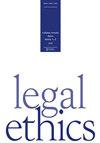Ethical imperatives for legal educators to promote law student wellbeing
IF 0.3
Q1 LAW
引用次数: 2
Abstract
ABSTRACT There is currently a debate about resilience and wellbeing of law students and legal practitioners. Tension has developed between a movement promoting the wellbeing of students and those who criticise that movement for individualising responsibility and enabling managers to evade their responsibilities. This article seeks a constructive resolution of that tension. It proposes ethical obligations for intentional curriculum design for the promotion of student well-being and the ongoing well-being of practitioners. In order to do this it explores different theoretical perspectives on ethical practice. It then uses self-determination theory, a theory of positive psychology, as a basis for applying the outcome of this analysis to the task of educating lawyers. Finally, it considers the implications of these analyses for the continuing responsibilities of the relevant communities: legal educators; practitioners, their employers and managers; regulators; and for the individual law student and lawyer.法律教育者促进法律系学生福祉的道德要求
目前,关于法律专业学生和法律从业人员的适应力和幸福感存在争议。一场促进学生福利的运动与批评这场运动将责任个人化、使管理者逃避责任的人之间的关系日趋紧张。本文寻求建设性地解决这种紧张关系。它提出了有意课程设计的道德义务,以促进学生的福祉和从业人员的持续福祉。为了做到这一点,它探讨了伦理实践的不同理论视角。然后,它使用自决理论,积极心理学的一种理论,作为将这一分析结果应用于律师教育任务的基础。最后,它考虑了这些分析对相关社区的持续责任的影响:法律教育者;从业人员、他们的雇主和管理者;监管机构;对于法律专业的学生和律师来说。
本文章由计算机程序翻译,如有差异,请以英文原文为准。
求助全文
约1分钟内获得全文
求助全文

 求助内容:
求助内容: 应助结果提醒方式:
应助结果提醒方式:


